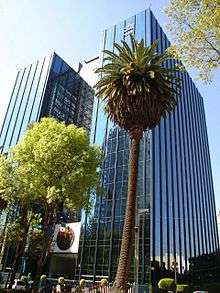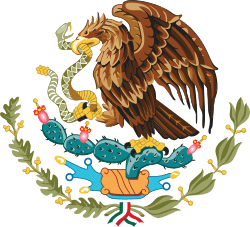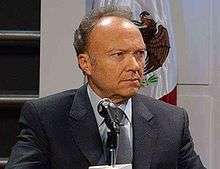Attorney General of Mexico
The Attorney General of the Republic is the head of the Attorney General's Office (Fiscalía General de la República, FGR) and the Federal Public Ministry of the United Mexican States, an institution belonging to the Federal Government's constitutional autonomous organism that is responsible for the investigation and prosecution of federal crimes. The office is governed mainly by the Constitution of Mexico on its article 102, and the Organic Law of the Attorney General's Office (Ley Orgánica de la Fiscalía General de la República).[1]
| Attorney General of Mexico | |
|---|---|
 Seal of the Attorney General of the Republic's Office. | |
| Fiscalía General de la República | |
| First holder | Pablo de la Garza |
| Website | www |

 |
|---|
| This article is part of a series on the politics and government of Mexico |
|
|
|
|
|
Organization
The Attorney General's Office is organized into several subordinate entities, including five Under-Attorney General Offices (Legal and International Affairs, Regional Control and Criminal Procedures, Specialized in Organized Crime, Specialized in Federal Crimes, Human Rights and Community Services, Prosecutor Offices such as the Office for Election-related Crimes, the Federal Ministerial Police, and the National Center for Planning, Analysis and Information for Combating Crime (Centro Nacional de Planeación, Análisis e Información para el Combate a la Delincuencia, CENAPI).
List of Attorneys General
21st century
- Alejandro Gertz Manero (1 December 2018 – present)
- Alberto Elías Beltrán (16 October 2017 – 30 November 2018)
- Raúl Cervantes Andrade (26 October 2016 – 16 October 2017)
- Arely Gómez González (27 February 2015 – 26 October 2016)
- Jesús Murillo Karam (4 December 2012 – 27 February 2015)
- Marisela Morales (1 April 2011 – 4 December 2012)
- Arturo Chávez (24 September 2009 – 31 March 2011)
- Eduardo Medina Mora (1 December 2006 – 7 September 2009)
- Daniel Cabeza de Vaca (28 April 2005 – 30 November 2006)
- Rafael Macedo de la Concha (1 December 2000 – 27 April 2005)
20th century
| Name | Term of Office |
|---|---|
| Rafael Rebollar | 1900–1911 |
| Manuel Castelazo Fuentes | 1911–1911 |
| Adolfo Valles | 1911–1913 |
| Francisco Modesto de Olaguíbel | 1914–1914 |
| Vicente Castro | 1914 |
| Pascual Morales y Molina | 1916–1917 |
| Pablo A. de la Garza | 1917–1918 |
| Carlos Salcedo | 1918–1920 |
| Eduardo Neri | 1920–1922 |
| Eduardo Delhumeau | 1922–1924 |
| Romeo Ortega y Castillo de Levín | 1925–1928 |
| Ezequiel Padilla Peñaloza | 1928–1928 |
| Enrique Medina | 1928–1930 |
| José Aguilar y Maya | 1930–1932 |
| Emilio Portes Gil | 1932–1934 |
| Silvestre Castro | 1934–1936 |
| Ignacio García Téllez | 1936–1937 |
| Antonio Villalobos Maillard | 1937–1937 |
| Genaro V. Vázquez Quiroz | 1937–1940 |
| José Aguilar y Maya | 1940–1946 |
| Francisco González de la Vega | 1946–1952 |
| Carlos Franco Sodi | 1952–1956 |
| Jose Aguilar y Maya | 1956–1958 |
| Fernando López Arias | 1958–1962 |
| Oscar Treviño Ríos | 1962–1964 |
| Antonio Rocha Cordero | 1964–1967 |
| Julio Sánchez Vargas | 1967–1971 |
| Pedro Ojeda Paullada | 1971–1976 |
| Oscar Flores Sánchez | 1976–1982 |
| Sergio García Ramírez | 1982–1988 |
| Enrique Álvarez del Castillo | 1988–1991 |
| Ignacio Morales Lechuga | 1991–1993 |
| Jorge Carpizo McGregor | 1993–1994 |
| Diego Valadés | 1994–1994 |
| Humberto Benítez Treviño | 1994–1994 |
| Antonio Lozano Gracia | 1994–1996 |
| Jorge Madrazo Cuéllar | 1996–2000 |
See also
- Justice ministry
- Law enforcement in Mexico

.svg.png)